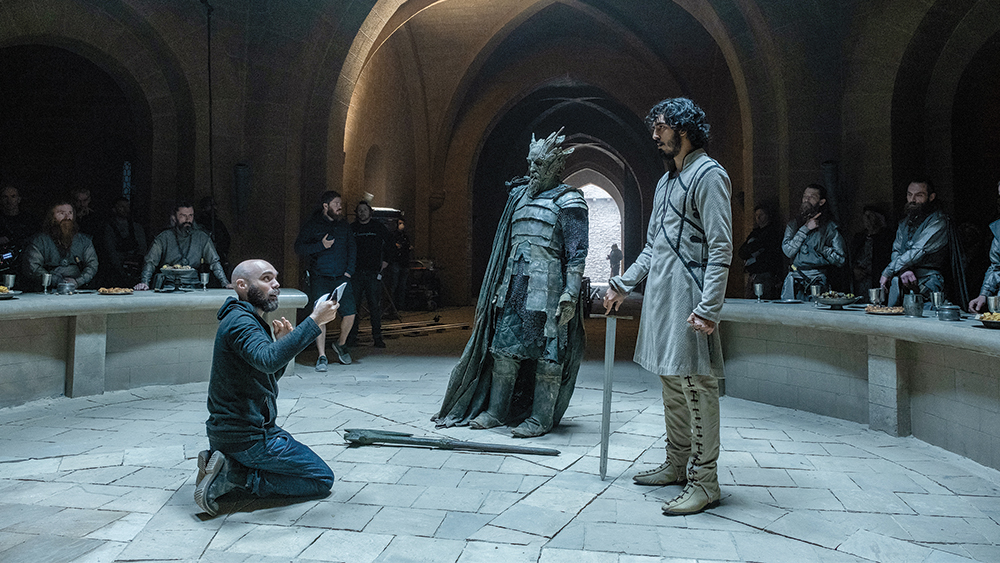By Alex McPherson
Based on the 14th-century Arthurian tale “Sir Gawain and the Green Knight,” director David Lowery’s film, aptly titled “The Green Knight,” is an impeccably constructed fantasy epic with bizarre imagery and dense themes begging to be mulled over for years to come.
The story begins in Camelot, with Gawain (Dev Patel), an aimless young warrior and nephew to King Arthur himself (Sean Harris), getting the chance to finally give his life purpose beyond drinking and cavorting his days away. During a Christmas gathering, the aging King and his wife, Queen Guinnevere (Kate Dickie), draw attention to the fact that Gawain doesn’t have any stories to tell — not yet, at least — and a mysterious, bark-covered giant shows up, calling himself the Green Knight (voiced by Ralph Ineson with imposing gusto).
The gritty medieval Groot offers a challenge to the Round Table — he will allow anyone brave enough to strike a blow against him, so long as they agree to receive the same treatment in one year. Gawain, careless as ever and wanting to impress his company and his suspicious mother, Morgan Le Fay (Sarita Choudhury), agrees to the challenge when nobody else will, promptly decapitating the Knight. He immediately regrets his decision, as the Knight, holding his severed head, gallops away on his horse laughing maniacally. In one year, Gawain must complete his end of the agreement. Oops.
The clock begins ticking, and once the year passes, Gawain sets out on his journey across a fantastical land to reach the Green Chapel and fulfill his pact. Unsurprisingly, the quest is grueling, and the self-doubting Gawain encounters a variety of strange entities — mischievous themes, a mournful spirit, and a fox companion, among others — that require him to confront his supposedly heroic ideals and his own mortality in the pursuit of becoming a legend.
Absolutely brimming with cinematic artistry and featuring a magnificent performance from Dev Patel, “The Green Knight” won’t appeal to viewers seeking a more traditional, action-packed epic that spoon-feeds them what to think or how to feel. Rather, Lowery’s masterpiece embraces all the sensory qualities of the film medium to fully transport viewers into Gawain’s journey, which winds up being far more existential than some viewers may be prepared for. There are certainly physical threats to be found along the way, but “The Green Knight” renders most of Gawain’s conflicts internal, as he grapples with his self-imposed burden and slowly but surely grows not only as a warrior, but as a human being, with imperfection to match his courage.
From its opening frames, “The Green Knight” is devoted to walking its own path and being undeniably weird while doing so. There’s tons to feast on stylistically — evocative, period-accurate costuming, lighting that evolves from decorated interiors to fog-drenched forests and blood red lakes, deliciously tactile sound design, and mystical yet lived-in environments, with a score by Daniel Hart fitting for a horror film in its off-kilter, slightly crazed rhythms. All of this is complemented by sweeping, at-times mind-boggling cinematography that flows through the royal interiors and vast landscapes that Gawain traverses, becoming ever-stupefying as Gawain treks onwards, further into his own soul. This is a film that demands to be watched on the biggest screen possible and with limited distractions.
Of course, Lowery’s film isn’t pure style over substance, and there’s plenty to contemplate in terms of storytelling and characters here. Gawain is a naive and reckless individual who isn’t initially easy to care about but develops in a significant fashion by the end. He’s forced to consider the sacrifices necessary for greatness, the notion of honor itself, and the fallibility of human nature despite illusions of superiority. Like Lowery’s other films, especially “A Ghost Story,” “The Green Knight” is focused on the concept of death, mortality, and Nature’s grip over us all. Indeed, the proceedings are depicted so ambiguously that some viewers may become frustrated with the film’s opaqueness. For this critic, however, the events — especially a nightmarish, darkly poetic sequence late in the film — haven’t left my mind, and keep revealing additional thematic layers the more I ponder them.
Lending “The Green Knight” an emotionally grounded core despite its vagueness, though, is Patel. A subversive casting choice for a story typically dominated by white men, he portrays the warrior’s growing insecurities in a subtle fashion that endears us to him from his first appearance onwards. Alicia Vikander also does excellent work playing dual roles, as Gawain’s lower-class girlfriend, Essel, and as a seductive temptress later on. Ineson, as the Green Knight, is intimidating, but has an aura of warmth and amusing self-awareness nevertheless. Barry Keoghan and Joel Edgerton give memorable turns as a creepy brigand and an uneasily jovial lad that Gawain encounters near the finale.
There’s a lot to digest once the credits roll — make sure to stay through them — that I’m eager to dive back into this wondrous, often frightening world to decipher all the symbolism and peculiar characters to unearth more meaning. I haven’t felt this way about many other films released in 2021 so far, but “The Green Knight” stands head and shoulders above most of them in terms of pure intellectual engagement and eye-popping creativity. Cinephiles shouldn’t expect anything less from A24, and viewers should go in knowing that “The Green Knight” engages the mind just as much as the senses, even if multiple viewings are all but required to fully appreciate it.

“The Green Knight” is a 2021 historical drama directed by David Lowery and starring Dev Patel, Joel Edgerton and Alicia Vikander. Rated R for violence, some sexuality and graphic nudity, it has a runtime of 2 hours, 10 minutes. The movie opened in theaters on July 30. Alex’s Grade: A+
Alex McPherson is an unabashed pop culture nerd and a member of the St. Louis Film Critics Association.

